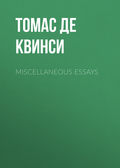
Томас де Квинси
The Uncollected Writings of Thomas de Quincey, Vol. 1
These are the two primary merits of the transcendental theory—1st, Its harmony with mathematics, and the fact of having first, by its doctrine of space, applied philosophy to the nature of geometrical evidence; 2ndly, That it has filled up, by means of its doctrine of categories, the great hiatus in all schemes of the human understanding from Plato downwards. All the rest, with a reserve as to the part which concerns the practical reason (or will), is of more questionable value, and leads to manifold disputes. But I contend, that, had transcendentalism done no other service than that of laying a foundation, sought but not found for ages, to the human understanding—namely, by showing an intelligible genesis to certain large and indispensable ideas—it would have claimed the gratitude of all profound inquiries. To a reader still disposed to undervalue Kant's service in this respect, I put one parting question—Wherefore he values Locke? What has he done, even if value is allowed in full to his pretensions? Has the reader asked himself that? He gave a negative solution at the most. He told his reader that certain disputed ideas were not deduced thus and thus. Kant, on the other hand, has given him at the least a positive solution. He teaches him, in the profoundest revelation, by a discovery in the most absolute sense on record, and the most entirely a single act—without parts, or contributions, or stages, or preparations from other quarters—that these long disputed ideas could not be derived from the experience assigned by Locke, inasmuch as they are themselves previous conditions under which any experience at all is possible: he teaches him that these ideas are not mystically originated, but are, in fact, but another phasis of the functions, or, forms of his own understanding; and, finally, he gives consistency, validity, and a charter of authority, to certain modes of nexus, without which the sum total of human experience would be a rope of sand.
In terminating this slight account of the Kantian philosophy, I may mention that in or about the year 1818-19, Lord Grenville, when visiting the lakes of England, observed to Professor Wilson that, after five years' study of this philosophy, he had not gathered from it one clear idea. Wilberforce, about the same time, made the same confession to another friend of my own.
It is not usual for men to meet with their capital disappointments in early life, at least not in youth. For, as to disappointments in love, which are doubtless the most bitter and incapable of comfort, though otherwise likely to arise in youth, they are in this way made impossible at a very early age, that no man can be in love to the whole extent of his capacity, until he is in full possession of all his faculties, and with the sense of dignified maturity. A perfect love, such as is necessary to the anguish of a perfect disappointment, presumes also for its object not a mere girl, but woman, mature both in person and character, and womanly dignity. This sort of disappointment, in a degree which could carry its impression through life, I cannot therefore suppose occurring earlier than at twenty-five or twenty-seven. My disappointment—the profound shock with which I was repelled from German philosophy, and which thenceforwards tinged with cynical disgust towards man in certain aspects, a temper which, originally, I will presume to consider the most benign that can ever have been created—occurred when I was yet in my twentieth year. In a poem under the title of Saul, written many years ago by Mr. Sotheby, and perhaps now forgotten, having never been popular, there occurs a passage of some pathos, in which Saul is described as keeping amongst the splendid equipments of a royal wardrobe, that particular pastoral habit which he had worn in his days of earliest manhood, whilst yet humble and undistinguished by honour, but also yet innocent and happy. There, also, with the same care, he preserved his shepherd's crook, which, in hands of youthful vigour, had been connected with remembrances of heroic prowess. These memorials, in after times of trouble or perplexity, when the burthen of royalty, its cares, or its feverish temptations, pointed his thoughts backwards, for a moment's relief, to scenes of pastoral gaiety and peace, the heart-wearied prince would sometimes draw from their repository, and in solitude would apostrophise them separately, or commune with the bitter-sweet remembrances which they recalled. In something of the same spirit—but with a hatred to the German philosopher such as men are represented as feeling towards the gloomy enchanter, Zamiel or whomsoever, by whose hateful seductions they have been placed within a circle of malign influences—did I at times revert to Kant: though for me his power had been of the very opposite kind; not an enchanter's, but the power of a disenchanter—and a disenchanter the most profound. As often as I looked into his works, I exclaimed in my heart, with the widowed queen of Carthage, using her words in an altered application—
'Quæsivit lucem—ingemuitque repertâ.'
Had the transcendental philosophy corresponded to my expectations, and had it left important openings for further pursuit, my purpose then was, to have retired, after a few years spent in Oxford, to the woods of Lower Canada. I had even marked out the situation for a cottage and a considerable library, about seventeen miles from Quebec. I planned nothing so ambitious as a scheme of Pantisocracy. My object was simply profound solitude, such as cannot now be had in any part of Great Britain—with two accessary advantages, also peculiar to countries situated in the circumstances and under the climate of Canada: viz. the exalting presence in an under-consciousness of forests endless and silent, the everlasting sense of living amongst forms so ennobling and impressive, together with the pleasure attached to natural agencies, such as frost, more powerfully manifested than in English latitudes, and for a much longer period. I hope there is nothing fanciful in all this. It is certain that, in England, and in all moderate climates, we are too slightly reminded of nature or the focus of nature. Great heats, or great colds (and in Canada there are both), or great hurricanes, as in the West Indian latitudes, recall us continually to the sense of a powerful presence, investing our paths on every side; whereas, in England, it is possible to forget that we live amongst greater agencies than those of men and human institutions. Man, in fact, 'too much man,' as Timon complained most reasonably in Athens, was then, and is now, our greatest grievance in England. Man is a weed everywhere too rank. A strange place must that be with us, from which the sight of a hundred men is not before us, or the sound of a thousand about us.
Nevertheless, being in this hotbed of man inevitably for some years, no sooner had I dismissed my German philosophy than I relaxed a little that spirit of German abstraction which it had prompted; and, though never mixing freely with society, I began to look a little abroad. It may interest the reader, more than anything else which I can record of this period, to recall what I saw within the ten first years of the century, that was at all noticeable or worthy of remembrance amongst the literati, the philosophers, or the poets of the time. For, though I am not in my academic period from 1804 to 1808, my knowledge of literary men—or men distinguished in some way or other, either by their opinions, their accomplishments, or their position and the accidents of their lives—began from the first year of the century, or, more accurately, from the year 1800; which, with some difficulty and demurs, and with some arguments from the Laureate Pye, the world was at length persuaded to consider the last year of the eighteenth century.23
MORAL EFFECTS OF REVOLUTIONS
(May, 1822.)
In revolutionary times, as when a civil war prevails in a country, men are much worse, as moral beings, than in quiet and untroubled states of peace. So much is matter of history. The English, under Charles II., after twenty years' agitation and civil tumults; the Romans after Sylla and Marius, and the still more bloody proscriptions of the Triumvirates; the French, after the Wars of the League and the storms of the Revolution—were much changed for the worse, and exhibited strange relaxations of the moral principle. But why? What is the philosophy of the case? Some will think it sufficiently explained by the necessity of witnessing so much bloodshed—the hearths and the very graves of their fathers polluted by the slaughter of their countrymen—the acharnement which characterises civil contests (as always the quarrels of friends are the fiercest)—and the license of wrong which is bred by war and the majesties of armies. Doubtless this is part of the explanation. But is this all? Mr. Coleridge has referred to this subject in The friend; but, to the best of my remembrance, only noticing it as a fact. Fichte, the celebrated German philosopher, has given us his view of it (Idea of War); and it is so ingenious, that it deserves mention. It is this—'Times of revolution force men's minds inwards: hence they are led amongst other things to meditate on morals with reference to their own conduct. But to subtilise too much upon this subject must always be ruinous to morality, with all understandings that are not very powerful, i. e. with the majority, because it terminates naturally in a body of maxims a specious and covert self-interest. Whereas, when men meditate less, they are apt to act more from natural feeling, in which the natural goodness of the heart often interferes to neutralise or even to overbalance its errors.'
PREFIGURATIONS OF REMOTE EVENTS. 24
(April, 1823.)
With a total disbelief in all the vulgar legends of supernatural agency, and that upon firmer principles than I fear most people could assign for their incredulity, I must yet believe that the 'soul of the world' has in some instances sent forth mysterious types of the cardinal events, in the great historic drama of our planet. One has been noticed by a German author, and it is placed beyond the limits of any rational scepticism; I mean the coincidence between the augury derived from the flight of the twelve vultures as types of the duration of the Roman empire, i. e. Western Empire, for twelve centuries, and the actual event. This augury we know to have been recorded many centuries before its consummation; so that no juggling or collusion between the prophets and the witnesses to the final event can be suspected. Some others might be added. At present I shall notice a coincidence from our own history, which, though not so important as to come within the class of prefigurations I have been alluding to, is yet curious enough to deserve mention. The oak of Boscobel and its history are matter of household knowledge. It is not equally well known, that in a medal, struck to commemorate the installation (about 1636) of Charles II., then Prince of Wales, as a Knight of the Garter, amongst the decorations was introduced an oak-tree with the legend—'Seris factura nepotibus umbram.'
MEASURE OF VALUE. 25
(December, 1823.)
To the reader.—This article was written and printed before the author heard of the lamented death of Mr. Ricardo.
It is remarkable at first sight that Mr. Malthus, to whom Political Economy is so much indebted in one chapter (viz. the chapter of Population), should in every other chapter have stumbled at every step. On a nearer view, however, the wonder ceases. His failures and his errors have arisen in all cases from the illogical structure of his understanding; his success was in a path which required no logic. What is the brief abstract of his success? It is this: he took an obvious and familiar truth, which until his time had been a barren truism, and showed that it teemed with consequences. Out of this position—That in the ground which limited human food lay the ground which limited human increase—united with this other position—That there is a perpetual nisus in the principle of population to pass that limit, he unfolded a body of most important corollaries. I have remarked in another article on this subject—how entirely these corollaries had escaped all Mr. Malthus's26 predecessors in the same track. Perhaps the most striking instance of this, which I could have alleged, is that of the celebrated French work—L'Ami des Hommes, ou Traité de la Population (written about the middle of the last century), which sets out deliberately from this principle, expressed almost in the very words of Mr. Malthus,—'Que la mésure de la Subsistance est celle de la Population;'—beats the bushes in every direction about it; and yet (with the exception of one corollary on the supposed depopulating tendency of war and famine) deduces from it none but erroneous and Anti-Malthusian doctrines. That from a truth apparently so barren any corollaries were deducible—was reserved for Mr. Malthus to show. As corollaries, it may be supposed that they imply a logical act of the understanding. In some small degree, no doubt; but no more than necessarily accompanies every exercise of reason. Though inferences, they are not remote inferences, but immediate and proximate; and not dependent upon each other, but collateral. Not logic but a judicious choice of his ground placed Mr. Malthus at once in a station from which he commanded the whole truth at a glance—with a lucky dispensation from all necessity of continuous logical processes. But such a dispensation is a privilege indulged to few other parts of Political Economy, and least of all to that which is the foundation of all Political Economy, viz. the doctrine of value. Having therefore repeatedly chosen to tamper with this difficult subject, Mr. Malthus has just made so many exposures of his intellectual infirmities—which, but for this volunteer display, we might never have known. Of all the men of talents, whose writings I have read up to this hour, Mr. Malthus has the most perplexed understanding. He is not only confused himself, but is the cause that confusion is in other men. Logical perplexity is shockingly contagious: and he, who takes Mr. Malthus for his guide through any tangled question, ought to be able to box the compass very well; or before he has read ten pages he will find himself (as the Westmorland guides express it) 'maffled,'—and disposed to sit down and fall a crying with his guide at the sad bewilderment into which they have both strayed. It tends much to heighten the sense of Mr. Malthus's helplessness in this particular point—that of late years he has given himself the air too much of teasing Mr. Ricardo, one of the 'ugliest customers' in point of logic that ever entered the ring. Mr. Ricardo is a most 'dangerous' man; and Mr. Malthus would do well not to meddle with so 'vicious' a subject, whose arm (like Neate's) gives a blow like the kick of a horse. He has hitherto contented himself very good-naturedly with gently laying Mr. Malthus on his back; but, if he should once turn round with a serious determination to 'take the conceit' out of him, Mr. Malthus would assuredly be 'put into chancery,' and suffer a 'punishment' that must distress his friends.—Amongst those whom Mr. Malthus has perplexed by his logic, I am not one: in matter of logic, I hold myself impeccable; and, to say nothing of my sober days, I defy the devil and all the powers of darkness to get any advantage over me, even on those days when I am drunk, in relation to 'Barbara, Celarent, Darii, or Ferio.'
'Avoid, old Satanas!' I exclaim, if any man attempts to fling dust in my eyes by false syllogism, or any mode of dialectic sophism. And in relation to this particular subject of value, I flatter myself that in a paper expressly applied to the exposure of Mr. Malthus's blunders in his Political Economy, I have made it impossible for Mr. Malthus, even though he should take to his assistance seven worse logicians than himself, to put down my light with their darkness. Meantime, as a labour of shorter compass, I will call the reader's attention to the following blunder, in a later work of Mr. Malthus's—viz. a pamphlet of eighty pages, entitled, The Measure of Value, stated and applied (published in the spring of the present year). The question proposed in this work is the same as that already discussed in his Political Economy—viz. What is the measure of value? But the answer to it is different: in the Political Economy, the measure of value was determined to be a mean between corn and labour; in this pamphlet, Mr. Malthus retracts that opinion, and (finally, let us hope) settles it to his own satisfaction that the true measure is labour; not the quantity of labour, observe, which will produce X, but the quantity which X will command. Upon these two answers, and the delusions which lie at their root, I shall here forbear to comment; because I am now chasing Mr. Malthus's logical blunders; and these delusions are not so much logical as economic: what I now wish the reader to attend to—is the blunder involved in the question itself; because that blunder is not economic, but logical. The question is—what is the measure of value? I say then that the phrase—'measure of value' is an equivocal phrase; and, in Mr. Malthus's use of it, means indifferently that which determines value, in relation to the principium essendi, and that which determines value, in relation to the principium cognoscendi. Here, perhaps, the reader will exclaim—'Avoid, Satanas!' to me, falsely supposing that I have some design upon his eyes, and wish to blind them with learned dust. But, if he thinks that, he is in the wrong box: I must and will express scholastic phrases; but, having once done this, I am then ready to descend into the arena with no other weapons than plain English can furnish. Let us therefore translate 'measure of value' into 'that which determines value:' and, in this shape, we shall detect the ambiguity of which I complain. For I say, that the word determines may be taken subjectively for what determines X in relation to our knowledge, or objectively for what determines X in relation to itself. Thus, if I were to ask—'What determined the length of the racecourse?' and the answer were—'The convenience of the spectators who could not have seen the horses at a greater distance,' or 'The choice of the subscribers,' then it is plain that by the word 'determined,' I was understood to mean 'determined objectively,' i. e. in relation to the existence of the object; in other words, what caused the racecourse to be this length rather than another length: but, if the answer were—'An actual admeasurement,' it would then be plain that by the word 'determined,' I had been understood to mean 'determined subjectively,' i. e. in relation to our knowledge;—what ascertained it?—Now, in the objective sense of the phrase, 'determiner of value,' the measure of value will mean the ground of value: in the subjective sense, it will mean the criterion of value. Mr. Malthus will allege that he is at liberty to use it in which sense he pleases. Grant that he is, but not therefore in both. Has he then used it in both? He will, perhaps, deny that he has, and will contend that he has used it in the latter sense as equivalent to the ascertainer or criterion of value. I answer—No: for, omitting a more particular examination of his use in this place, I say that his use of any word is peremptorily and in defiance of his private explanation to be extorted from the use of the corresponding term in him whom he is opposing. Now he is opposing Mr. Ricardo: his labour which X commands—is opposed to Mr. Ricardo's quantity of labour which will produce X. Call the first A, the last B. Now, in making B the determiner of value, Mr. Ricardo means that B is the ground of value: i. e. that B is the answer to the question—what makes this hat of more value than this pair of shoes? But, if Mr. Malthus means by A the same thing, when by his own confession he has used the term measure of value in two senses: on the other hand, if he does not mean the same thing, but simply the criterion of value, then he has not used the word in my sense which opposes him to Mr. Ricardo. And yet he advances the whole on that footing. On either ground, therefore, he is guilty of a logical error, which implies that, so far from answering his own question, he did not know what his own question was.







